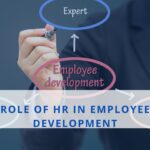In today’s fast-paced business environment, the success of any organization depends on a skilled, motivated, and engaged workforce. Employee Development is at the heart of building this workforce, and Human Resources (HR) plays an evolving and critical role in designing strategies that foster growth, enhance performance, and strengthen organizational resilience.
HR as a Strategic Workforce Partner
HR has transitioned from an administrative function to a strategic partner that drives workforce growth. By analyzing business objectives, identifying skill gaps, and implementing development initiatives, HR ensures that employees are equipped with the capabilities needed to contribute effectively.
This strategic role enables HR to influence employee retention, productivity, and engagement while aligning talent growth with long-term organizational goals.
Implementing Effective Training Programs
Training remains the cornerstone of employee development. HR is responsible for designing programs that meet both employee needs and organizational objectives. These initiatives in 2025 are increasingly digital, interactive, and tailored to individual learning paths.
Common HR-led training initiatives include:
-
Technical and digital skills enhancement
-
Leadership and management development
-
Soft skills training, including communication, problem-solving, and teamwork
-
Industry certifications and compliance programs
-
Cross-functional and mobility-focused learning
By delivering continuous, targeted training, HR ensures employees are capable, confident, and ready to take on new challenges.
Performance Management and Career Planning
Performance management is integral to HR’s role in fostering workforce growth. Modern appraisal systems focus on ongoing feedback, coaching, and development rather than annual reviews.
Through structured performance evaluations, HR identifies top performers, development needs, and potential leaders. Career planning initiatives provide employees with a roadmap for advancement, increasing engagement and long-term retention while strengthening organizational capability.
Employee Engagement and Motivation
Employee engagement drives both productivity and workforce growth. HR creates programs that enhance motivation, loyalty, and commitment. Mentorship programs, recognition systems, wellness initiatives, and professional development opportunities ensure employees feel valued.
An engaged workforce improves collaboration, innovation, and overall performance. By integrating development and engagement strategies, HR creates an environment where employees are inspired to grow alongside the organization.
Leveraging Technology in Employee Development
Technology has transformed the way HR delivers employee development programs. Digital tools make training more accessible, personalized, and measurable, enabling HR to scale initiatives across the organization effectively.
Key technology-driven strategies include:
-
AI-based career and skill development recommendations
-
Learning Management Systems (LMS) for structured learning
-
Virtual reality simulations for practical skill acquisition
-
Mobile learning platforms for flexibility
-
Analytics dashboards to track progress and measure outcomes
By leveraging technology, HR ensures that development programs are efficient, impactful, and aligned with workforce growth goals.
Cultivating a Continuous Learning Culture
A culture of continuous learning is essential for workforce growth. HR fosters an environment where employees are encouraged to acquire new skills, share knowledge, and innovate.
Key aspects include:
-
Leadership support for professional development
-
Mentorship and cross-department knowledge sharing
-
Incentives for learning achievements
-
Encouraging experimentation and learning from mistakes
A strong learning culture enhances adaptability, creativity, and long-term workforce sustainability.
Diversity, Equity, and Inclusion in Development
Inclusive employee development programs are critical for workforce growth. HR ensures that all employees, regardless of background, have access to training, mentorship, and advancement opportunities.
Integrating diversity, equity, and inclusion (DEI) into development initiatives:
-
Encourages diverse perspectives and innovation
-
Improves collaboration and team performance
-
Enhances employee satisfaction and retention
-
Strengthens organizational reputation
By fostering inclusivity, HR ensures that workforce development benefits all employees while supporting organizational success.
Leadership Development and Succession Planning
HR plays a pivotal role in preparing future leaders. Leadership development programs identify high-potential employees and provide mentorship, training, and stretch assignments to prepare them for leadership roles.
Succession planning ensures continuity in critical positions and mitigates risks associated with leadership gaps. By cultivating internal talent, HR strengthens workforce resilience and long-term growth prospects.
Adapting Development Strategies for Hybrid and Remote Work
With remote and hybrid work becoming standard in 2025, HR must adapt development programs to meet the needs of distributed teams. Virtual onboarding, online training, and flexible learning options ensure all employees have access to growth opportunities.
Key strategies include:
-
Digital mentorship and coaching programs
-
Virtual leadership and skills training
-
Remote performance tracking and feedback
-
Cross-cultural training for global teams
These approaches ensure consistent workforce growth regardless of location, demonstrating HR’s evolving role in employee development.
Measuring the Effectiveness of Employee Development
HR must assess the impact of development initiatives to validate their contribution to workforce growth. Metrics such as productivity, engagement, retention, and business performance provide insights into program effectiveness.
By using data to refine strategies and optimize programs, HR strengthens its position as a strategic driver of workforce growth and organizational success.
About Us:
BusinessInfoPro is your essential gateway to cutting-edge business insights and strategic innovation, delivering expertly curated analysis on digital transformation, AI-powered planning, ERP optimization, sustainability, and marketing trends. We bridge the gap between emerging technologies and practical business applications whether it’s exploring AI’s impact on enterprise planning, optimizing supply-chain processes, or decoding the future of digital platforms and advertising. Our content empowers leaders to make informed decisions, stay ahead in competitive landscapes, and confidently navigate disruptions. Backed by forward-thinking perspectives and rigorous analysis, Businessinfopro is committed to equipping professionals with the tools and knowledge they need to transform challenges into opportunities and drive growth in a rapidly evolving business ecosystem.

